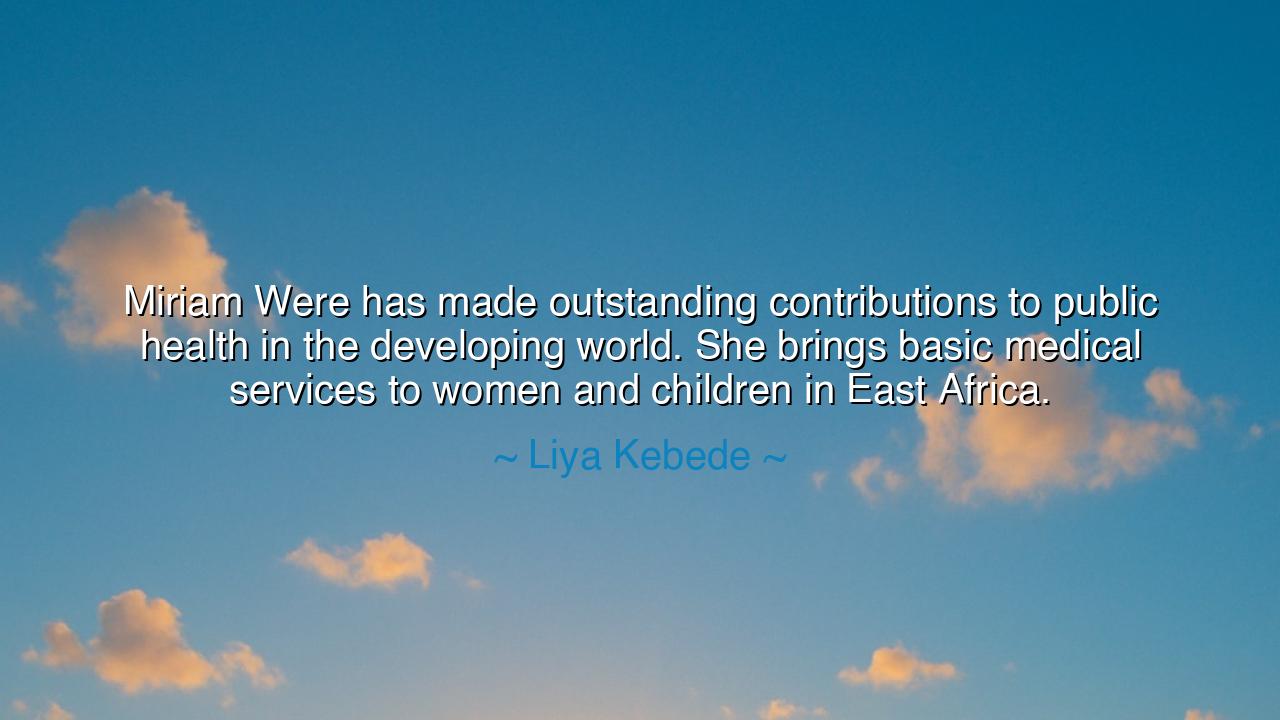
Miriam Were has made outstanding contributions to public health
Miriam Were has made outstanding contributions to public health in the developing world. She brings basic medical services to women and children in East Africa.






The words of Liya Kebede—“Miriam Were has made outstanding contributions to public health in the developing world. She brings basic medical services to women and children in East Africa.”—shine with reverence for a life devoted to service. They remind us that greatness is not always found in thrones, nor in the wealth of kings, but in the hands that heal the poor, the forgotten, the vulnerable. In honoring Miriam Were, Kebede honors not only a woman, but the eternal spirit of compassion, courage, and justice that moves through those who dedicate their lives to the health of others.
From the ancient days, healers were revered as guardians of life. They walked among villages, carrying herbs, knowledge, and the strength of presence. Public health, in its truest sense, is the modern continuation of that ancient calling: to protect not the few, but the many; to bring care not only to palaces, but to huts and fields. Were’s work in East Africa, where she carried medical services to women and children, is an echo of this timeless role. She does not chase prestige, but meets people where they are, giving them the most basic gift: survival.
Her story is one of struggle and triumph. In many parts of the developing world, mothers and children suffer and die not because cures do not exist, but because access does not reach them. Diseases once eradicated in the wealthy nations still steal lives in the villages of Africa. Miriam Were fought to change this, not with weapons, but with knowledge, with clinics, with networks of care that brought basic medical services to those the world had overlooked. Like a shepherd guarding her flock, she refused to let the weakest be lost.
History offers us parallels to her mission. Consider Florence Nightingale, who during the Crimean War brought not only healing to soldiers, but order, sanitation, and systems of care that transformed nursing and public health forever. Nightingale did not seek glory on the battlefield, but her quiet reforms saved more lives than armies. So too does Were, in East Africa: her work may not roar like the cannons of war, but it saves countless lives through the steady strength of prevention, education, and care. Such labors, though humble, are heroic in the truest sense.
The meaning of Kebede’s words also lies in the focus on women and children. To heal a woman is to heal a family; to protect a child is to protect the future. Those who labor in this way understand the sacred truth: societies rise or fall on how they treat their most vulnerable. Were’s commitment to mothers and children is not a small task, but the foundation upon which generations of health and strength are built. To neglect them is to sow death; to serve them is to cultivate life.
The lesson for us is profound: do not measure greatness by wealth or power, but by service to those who cannot repay you. Miriam Were shows us that one life, lived with courage and vision, can transform entire communities. Her work teaches us that public health is not an abstraction, but the difference between life and death, hope and despair, for millions of unseen faces. To follow her example is to remember that the highest calling is not self-glory, but self-giving.
Practical action lies before us: support those who labor in global health, give voice to the voiceless, and invest in systems that protect the vulnerable. In daily life, remember that kindness, service, and compassion are the building blocks of health in every society. Teach your children to honor such examples, so that they may grow not seeking fame, but seeking to serve. And if you are called to heal, whether as a doctor, nurse, teacher, or neighbor, step forward with courage, knowing that your actions echo through generations.
So let Liya Kebede’s words be remembered as both praise and summons. Miriam Were, like Nightingale before her, stands as proof that true greatness lies in the service of humanity. She embodies the wisdom of the ancients: that to heal the least is to honor life itself. Let us walk in her path, so that we too may bring light into places of darkness, strength into places of weakness, and health into places of despair. For in doing so, we will not only honor the vulnerable—we will honor life itself.






AAdministratorAdministrator
Welcome, honored guests. Please leave a comment, we will respond soon